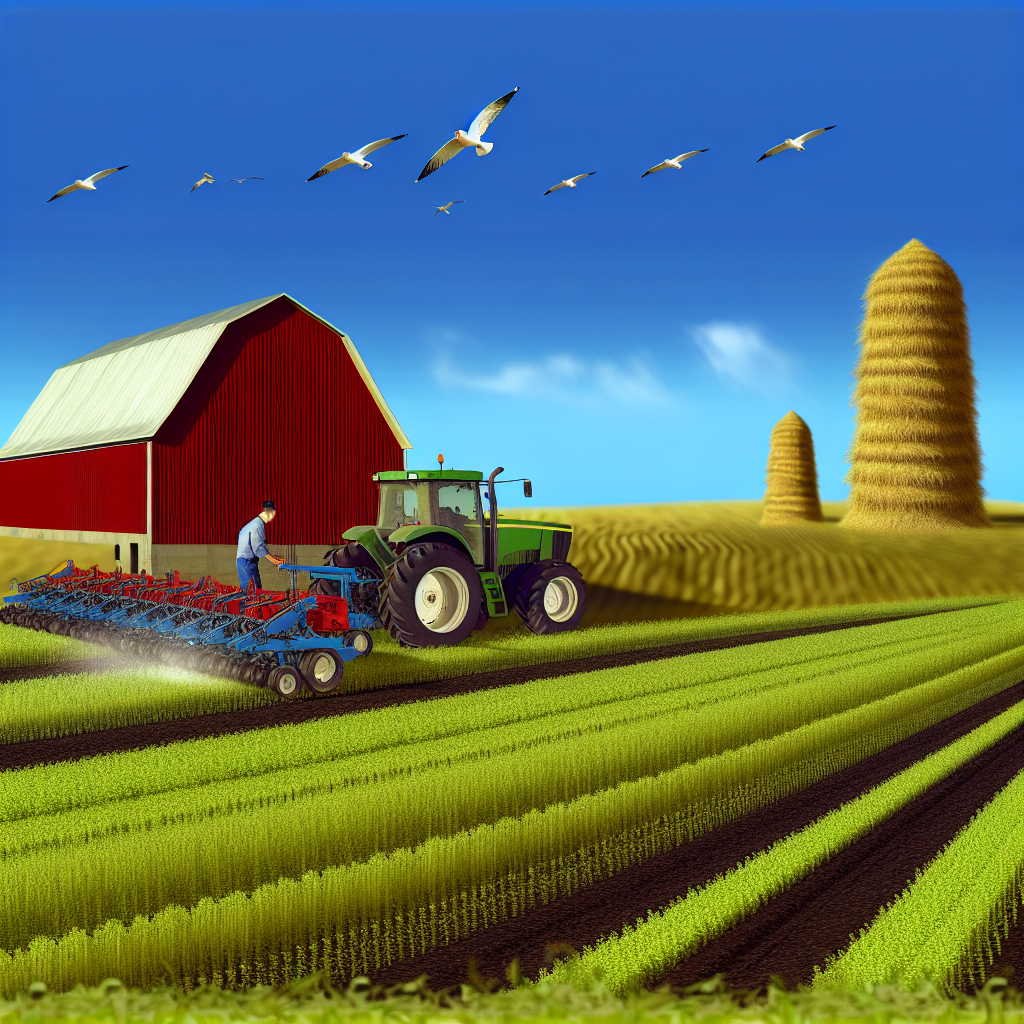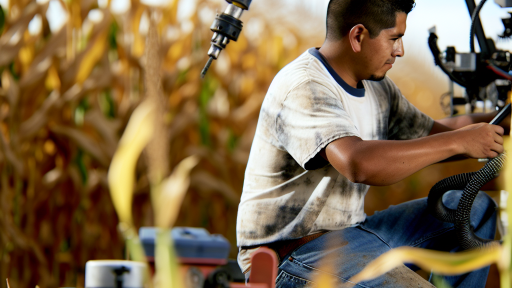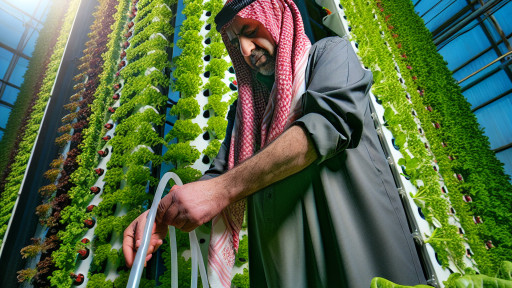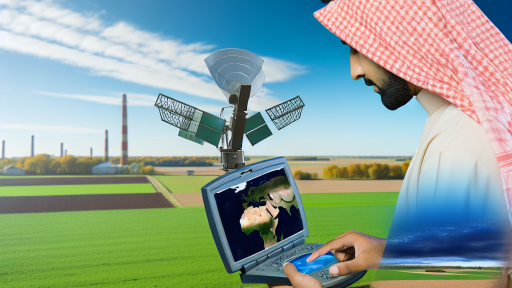Introduction to Automated Machinery Solutions and Their Importance for Small Farmers
Automated machinery solutions enhance farming efficiency.
They provide small farmers with the tools to compete effectively.
Furthermore, these solutions save time and labor costs.
Increasing Efficiency through Automation
Automation simplifies repetitive tasks in farming operations.
Small farmers can utilize technology to boost productivity.
For instance, automated planting and harvesting reduce manual labor.
This approach allows farmers to focus on other essential tasks.
Reducing Labor Costs
Labor expenses can heavily impact farm profitability.
Automated machinery can decrease the dependency on seasonal workers.
As a result, farmers can manage costs more effectively.
Additionally, technological solutions minimize errors associated with manual labor.
Enhancing Precision in Farming
Automated equipment offers precise control over farming processes.
Such precision leads to better resource management.
For example, precision agriculture technologies optimize water usage.
This results in healthier crops and improved yields.
Transform Your Agribusiness
Unlock your farm's potential with expert advice tailored to your needs. Get actionable steps that drive real results.
Get StartedAdapting to Climate Challenges
Climate change poses significant challenges for small farmers.
Automated solutions help farmers adapt to these changes.
For instance, smart irrigation systems respond to weather conditions.
Consequently, these systems ensure crops receive adequate water.
Access to Data and Insights
Automation generates valuable data for informed decision-making.
Farmers can analyze this information to improve practices.
This leads to enhanced crop planning and management strategies.
Ultimately, it strengthens the farm’s overall sustainability.
Overview of Common Types of Automated Machinery Used in Small Farms
Seeders and planters automate the planting process efficiently.
These machines ensure precise seed placement for optimal growth.
They often come equipped with adjustable settings for different crops.
Farmers benefit by saving time and labor costs.
Additionally, these tools enhance planting accuracy and reduce waste.
Seeders and Planters
Harvesters significantly expedite the harvesting process.
They are designed to handle various types of crops, including grains and vegetables.
Portable models allow easier movement across small farms.
Using harvesters reduces the need for manual labor during peak seasons.
This machinery maximizes productivity while minimizing crop loss.
Harvesters
Automated irrigation systems improve water management on farms.
These systems include drip, pivot, and sprinkler methods.
Farmers can program schedules to ensure proper hydration.
Efficient irrigation conserves water and promotes sustainable practices.
Furthermore, these systems reduce labor requirements for watering crops.
Irrigation Systems
Automated tillage equipment enhances soil preparation before planting.
Showcase Your Farming Business
Publish your professional farming services profile on our blog for a one-time fee of $200 and reach a dedicated audience of farmers and agribusiness owners.
Publish Your ProfileThese machines include plows, cultivators, and harrows.
They improve soil structure and aeration for better crop yields.
Farmers can adjust the depth and intensity based on soil conditions.
As a result, they foster healthier plants and more productive harvests.
Soil Tillage Equipment
Innovative pest and weed control machinery boosts crop health.
These machines apply pesticides and herbicides with precision.
They help minimize chemical usage while maximizing effectiveness.
Farmers can program operation times to target specific pests or weeds.
This technology supports more environmentally-friendly farming practices.
Pest and Weed Control Machinery
Automated livestock monitoring tools ensure animal health and productivity.
These solutions track feeding, breeding, and health metrics efficiently.
Farmers receive alerts for any irregularities in real-time.
As a result, they can respond quickly to issues affecting their herd.
Moreover, these tools enhance overall management and reduce losses.
Livestock Monitoring Solutions
Benefits of Using Automated Machinery
Cost-Effectiveness
Automated machinery significantly lowers operational costs for small farmers.
These machines require less manual labor, which reduces labor expenses.
Moreover, they often use precision agriculture techniques.
This reduces wasted resources and increases crop yields.
Ultimately, farmers can invest savings into other areas of their business.
Efficiency
Automated machinery enhances the efficiency of farming operations.
These machines perform tasks faster than human workers.
For instance, planting and harvesting become quicker and more accurate.
This efficiency allows farmers to focus on other critical aspects of their operations.
Furthermore, with automation, farmers can maximize their use of time and resources.
Improved Precision
Automated systems provide enhanced precision in farming practices.
Utilizing GPS technology, machines can plant seeds at optimal depths and spacing.
This precision improves crop health and yield potential.
Additionally, it minimizes overlaps and gaps during planting, reducing waste.
As a result, farmers experience consistent and higher-quality harvests.
Flexibility in Operations
Automated machinery offers significant flexibility for small farmers.
Farmers can schedule equipment to operate at any time, even off-peak hours.
This flexibility allows for adjustments during peak planting or harvesting seasons.
Also, automated systems can adapt to various field conditions and crop types.
This adaptability ultimately leads to better management of diverse farming practices.
Reduction in Physical Strain
Another benefit of automated machinery is the reduction of physical strain on farmers.
Tasks such as lifting heavy loads and repetitive motions can lead to injuries.
Automation reduces these physically demanding tasks significantly.
This leads to a healthier workforce and reduced medical expenses.
Farmers can enjoy longer careers without physical limitations.
You Might Also Like: Choosing the Right Automated Equipment for Your Farm
Showcase Your Farming Business
Publish your professional farming services profile on our blog for a one-time fee of $200 and reach a dedicated audience of farmers and agribusiness owners.
Publish Your ProfileTypes of Crop-Specific Automated Solutions: From Planting to Harvesting
Automated Planting Systems
Automated planting systems enhance efficiency in crop production.
These systems save time and labor costs for small farmers.
They ensure that seeds are planted at optimal depths and spacing.
Farmers can select from various machinery tailored to specific crops.
For instance, precision planters work well for row crops like corn and soybeans.
On the other hand, seed drills are ideal for smaller seeds like barley.
Crop Maintenance and Monitoring Technologies
Crop maintenance technologies help farmers keep crops healthy.
Automated irrigation systems provide precise water levels to crops.
This technology minimizes water waste during critical growth periods.
Furthermore, drones allow farmers to monitor crop health remotely.
These drones capture images and data for analysis and decision-making.
Automated Harvesting Solutions
Automated harvesting solutions revolutionize the harvesting process.
These machines increase efficiency by reducing manual labor.
Specialized harvesters exist for various crops, including fruits and vegetables.
For example, berry pickers gently harvest without damaging the fruit.
Similarly, automated grape harvesters assist winemakers during the harvest season.
Post-Harvest Processing and Packaging
Post-harvest solutions offer comprehensive processing options.
Automated sorting systems help categorize produce by size and quality.
This ensures that only the best products reach consumers.
Additionally, packaging machines streamline the packing process.
They save time and reduce the risk of contamination.
As a result, small farmers can expedite their market readiness.
Discover More: Monitoring Soil Health Using Remote Sensing
Technological Innovations in Agricultural Automation
Enhancing Efficiency for Small Scale Farmers
Innovative machinery provides crucial support for small scale farmers.
These advancements streamline daily operations and enhance productivity.
Moreover, they help farmers optimize their resource allocation.
For example, automated planting systems reduce manual labor significantly.
Additionally, precision irrigation systems ensure optimal water usage.
Such technology minimizes waste while maximizing crop yield.
Affordable Automation Options
Affordability is essential for small farmers considering automation.
Several companies offer cost-effective solutions tailored for small operations.
For instance, FarmTech provides compact tractors designed for limited spaces.
Furthermore, SeedMaster specializes in low-cost planting machinery.
These solutions allow farmers to adopt technology without financial strain.
As a result, farmers can increase their competitive edge in the market.
Impact of Remote Monitoring Systems
Remote monitoring technology has transformed farm management.
Farmers can now track crop health and soil conditions in real-time.
Sensors placed within the field provide invaluable data to users.
Consequently, farmers can make informed decisions promptly.
This technology also helps in identifying and addressing issues early.
Showcase Your Farming Business
Publish your professional farming services profile on our blog for a one-time fee of $200 and reach a dedicated audience of farmers and agribusiness owners.
Publish Your ProfileIn addition, it fosters better communication with agricultural experts.
Sustainability through Automation
Automation contributes significantly to sustainable farming practices.
It reduces reliance on chemical fertilizers and pesticides.
This methodology minimizes environmental impact while boosting efficiency.
For example, drones can apply necessary nutrients precisely where needed.
Thus, they enhance soil health without unnecessary chemical runoff.
Furthermore, small farmers can adopt these greener practices easily.
Future Trends in Automated Machinery
The future of agricultural automation appears promising for small farmers.
We expect continual improvements in technology accessibility and affordability.
Advanced robotics will further streamline labor-intensive tasks.
Additionally, AI will play a pivotal role in decision-making processes.
Farmers will be able to forecast crop yields with greater accuracy.
Overall, these innovations create a more efficient and sustainable farming landscape.
Find Out More: Advanced Technologies Enhancing Vertical Farming Practices

Integration of Automated Solutions with Existing Farming Practices
Understanding Automation in Agriculture
Automation in agriculture refers to using technology to perform tasks that previously required manual labor.
It boosts efficiency while reducing the physical demands on farmers.
Small farmers can greatly benefit from various automated machinery solutions.
Assessing Current Farming Practices
Many farmers have established methods based on traditional practices.
These practices often reflect local conditions and resource availability.
To integrate automation, farmers must first assess their existing workflows.
Identifying tasks that take up considerable time is crucial.
This assessment helps pinpoint opportunities for automation.
Choosing the Right Automated Solutions
Various automated machinery solutions exist for small farmers.
Examples include robots for planting, harvesting, and watering.
Furthermore, drone technology can assist in monitoring crops efficiently.
Farmers should evaluate their specific needs before purchasing equipment.
Compatibility with existing systems is also vital.
Training and Support for Farmers
Training is essential for successful integration of automated solutions.
Farmers need to understand how to operate new machinery effectively.
Many manufacturers offer training programs to assist farmers.
Support from fellow farmers can also help ease the transition.
Monitoring and Continuous Improvement
Implementing automation is just the beginning of the journey.
Farmers must continuously monitor the performance of automated systems.
This ongoing assessment enables them to make necessary adjustments.
Over time, farmers can optimize workflows and enhance productivity.
Success Stories from Small Farmers
Several small farmers have successfully integrated automation into their practices.
Emily Larson, for instance, uses automated irrigation systems.
This technology has significantly reduced her water usage.
Moreover, James O’Connor employs a planting robot that boosts efficiency.
These examples highlight the positive impact of automation on small farms.
Showcase Your Farming Business
Publish your professional farming services profile on our blog for a one-time fee of $200 and reach a dedicated audience of farmers and agribusiness owners.
Publish Your ProfileGain More Insights: Automated Machinery for Farm Logistics and Supply
Case Studies: Successful Implementation of Automated Machinery by Small Farmers
Introduction to Automated Machinery in Agriculture
Automated machinery revolutionizes farming practices for small-scale farmers.
It enhances efficiency and reduces labor costs significantly.
Many farmers have adopted these technologies to improve productivity.
Case Study: Juan’s Organic Produce
Juan Garcia runs a small organic farm in Southern California.
Last year, he invested in a robotic harvester for his strawberry crop.
This machinery increased his harvesting efficiency by 40%.
As a result, he also reduced labor costs during peak season.
Case Study: Emily’s Vegetable Farm
Emily Thompson operates a vegetable farm in Michigan.
She implemented a precision planting machine last spring.
This equipment enables her to plant seeds more accurately.
Consequently, she observed a 25% increase in crop yield.
Case Study: The Ananda Family Farm
The Ananda family runs a mixed farm in Georgia.
They adopted an automated irrigation system to optimize water usage.
This system adjusts irrigation based on weather conditions and soil moisture.
The family reported a significant decrease in water usage by 30%.
Impact on Local Communities
Automated machinery positively impacts local farming communities.
Farmers can produce more food sustainably and efficiently.
Increased productivity leads to higher incomes and improved livelihoods.
Moreover, it helps in attracting younger generations to farming.
Challenges Faced by Small Farmers
Despite the benefits, small farmers face challenges when adopting automation.
Initial costs for machinery can be prohibitive for some.
Additionally, technical knowledge is necessary to operate new machines.
Access to training programs can mitigate these challenges.
Future Directions in Automated Agriculture
More small farmers are likely to embrace automated machinery in the coming years.
The benefits far outweigh the initial investments in most cases.
As technology advances, these tools will become more accessible to all farmers.
Ultimately, automated machinery can lead to a more sustainable agricultural future.
Future Trends in Agricultural Automation
Emerging Technologies
New technologies are transforming agricultural practices daily.
Precision agriculture improves crop management and resource use.
Robotics enhances harvesting efficiency and reduces labor costs.
Data analytics allows farmers to make informed decisions quickly.
Automation systems are becoming more accessible to small farmers.
Benefits for Small Farmers
Small farmers can increase productivity through automation.
Reduced labor costs lead to improved profit margins.
Automation helps manage tasks that require precision and speed.
Access to advanced technology levels the playing field.
Farmers gain the ability to track and analyze crop performance.
Investment Opportunities
Investing in automation can yield long-term benefits.
Grants and subsidies can help small farmers adopt new technologies.
Showcase Your Farming Business
Publish your professional farming services profile on our blog for a one-time fee of $200 and reach a dedicated audience of farmers and agribusiness owners.
Publish Your ProfilePartnerships with tech companies foster innovation in farming.
A focus on sustainable practices attracts eco-conscious investors.
Farmers can participate in pilot programs to experiment with automation.
Challenges to Overcome
Adoption of automation comes with initial financial investments.
Small farmers may face barriers in training and education.
Maintaining technological systems requires ongoing support.
Farmers need to stay updated with evolving technologies.
Access to reliable internet connectivity can be a challenge.
Looking Ahead
The future of agriculture lies in smart farming solutions.
Continued research and development will enhance automation.
Collaboration among farmers, technologists, and policymakers drives innovation.
As automation evolves, small farmers will reap its rewards.
Ultimately, automated machinery solutions can sustain small farms.
Additional Resources
Precision Agriculture: Benefits and Challenges for Technology …




